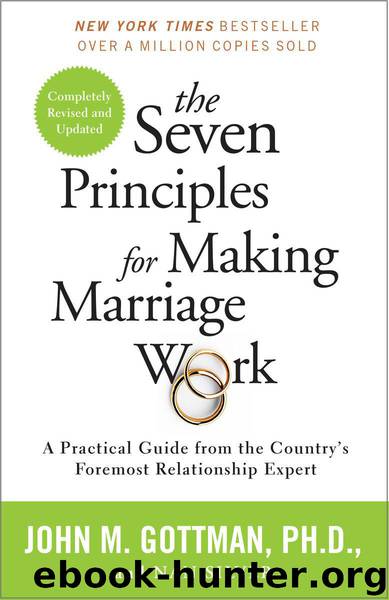The Seven Principles for Making Marriage Work: A Practical Guide from the Country's Foremost Relationship Expert by Gottman John Phd & Silver Nan

Author:Gottman, John Phd & Silver, Nan [Gottman, John Phd]
Language: eng
Format: azw
ISBN: 9781101902912
Publisher: Potter/TenSpeed/Harmony
Published: 2015-05-05T04:00:00+00:00
Telling the Difference
If you and your spouse are entrenched in conflict, it may not be obvious which of the two types of disagreement you’re having—gridlocked or solvable. One way to identify solvable problems is that they seem less painful, gut-wrenching, or intense than perpetual, gridlocked ones. That’s because when you argue over a solvable problem, your focus is only on a particular dilemma or situation. There is no underlying conflict that’s fueling your dispute.
For example, for years Eleanor has been arguing with her husband, Miguel, that he drives too fast. He always tells her the same thing, that he’s never had an accident, he’s an assertive driver not an aggressive one. She ends up yelling that he’s selfish and doesn’t care that his speeding scares her. He retorts that the real problem is her lack of trust in him. Each time they have this squabble, they feel all the more frustrated and hurt and entrenched in their positions. There’s a lot of vilifying on both sides. For this couple, speeding constitutes a perpetual problem they will probably never fully resolve. They are really arguing about Big Issues like trust, security, selfishness. To keep their ongoing battles over driving from ruining their marriage, they’ll need to understand the deeper meaning that this battle has for each of them.
But for Rachel and Jason, disagreements over driving speeds constitute a solvable problem. Every morning they commute together from their suburban home to downtown Pittsburgh. She thinks he drives too fast. He says he has to speed because she takes so long to get ready and he doesn’t want to be late to work. Rachel says it takes her so long in the morning because he showers first and takes forever. Plus, he always leaves the breakfast dishes on the table. While she’s busy washing them, he’s honking the horn for her to hurry. By the time Jason drops Rachel off at her office, he’s stonewalling and she’s fighting back tears.
This couple’s difficulty over driving is a solvable problem. For starters, it is situational—it occurs only when they are going to work, and it doesn’t reverberate into other areas of their lives. Unlike Eleanor and Miguel, they don’t vilify each other. Their arguments aren’t about selfishness or trust—they’re simply about driving and their morning routine. By learning a more effective way to talk with each other about the issue, they could readily find a compromise. Maybe they could set their alarm fifteen minutes earlier, or she could shower first, or he could just remember to deal with the dishes.
However, if Rachel and Jason don’t find a way to compromise on this issue, it’s likely that they will become increasingly resentful and entrenched in their positions. The conflict could deepen and take on more symbolic meaning. In other words, it could evolve into a gridlocked, perpetual problem.
Below I’ve described various scenarios of marital conflict. For each one, mark whether you think it’s solvable or perpetual.
1. Cliff and Lynn agree that it’s Cliff’s job to take out the kitchen trash every evening after dinner.
Download
This site does not store any files on its server. We only index and link to content provided by other sites. Please contact the content providers to delete copyright contents if any and email us, we'll remove relevant links or contents immediately.
The 5 Love Languages: The Secret to Love That Lasts by Gary Chapman(9787)
Doing It: Let's Talk About Sex... by Hannah Witton(9275)
Should I Stay or Should I Go? by Ramani Durvasula(7652)
The Road Less Traveled by M. Scott Peck(7594)
The Lost Art of Listening by Michael P. Nichols(7494)
Daring Greatly by Brene Brown(6502)
Beartown by Fredrik Backman(5737)
We Need to Talk by Celeste Headlee(5608)
Men In Love by Nancy Friday(5234)
The Rules Do Not Apply by Ariel Levy(4957)
The State of Affairs by Esther Perel(4711)
How To Win Friends and Influence People by Dale Carnegie(4502)
Reflections Of A Man by Mr. Amari Soul(4288)
Pillow Thoughts by Courtney Peppernell(4271)
The Ethical Slut by Janet W. Hardy(4242)
Algedonic by r.h. Sin(4056)
Surrounded by Idiots by Thomas Erikson(4030)
He's Just Not That Into You by Greg Behrendt & Liz Tuccillo(3891)
I Love You But I Don't Trust You by Mira Kirshenbaum(3865)
